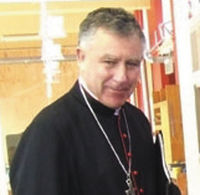
It was to meet the needs of those attached to the Latin Mass that Pope Benedict XVI issued his motu proprio, Summorum pontificum in July 2007, allowing for the celebration of the Mass in Latin, according to the 1962 Missal.
The words, motu proprio, are Latin for ‘on his own impulse’, and such a document does not carry the weight of, for example, a dogmatic or pastoral constitution as with several documents of the second Vatican council, that have shaped the revised forms of liturgy we now celebrate in the church.
In the motu proprio, Pope Benedict outlines a key condition for the celebration of this extraordinary form of the Mass:
In parishes, where there is a stable group of faithful who adhere to the earlier liturgical tradition (n. 5)
It is important to note that this is a parish-based option, and is not a question of creating ‘regional’ gatherings for a Mass in Latin; and that there be a stable group of faithful who worship in this manner. The motu proprio does not intend to promote a widespread practice of the Mass in Latin, nor a systematic restoration of the Latin Mass in parishes.
Having studied the document carefully, and having listened to the request of some Catholics in the archdiocese, I, as Archbishop of Wellington, have made a Special Pastoral Provision for a regular Mass in Latin in St John’s Church, Ngaio. I have asked a priest to provide this service. St Mary’s Convent Chapel which was formerly the venue for the Latin Mass is no longer available.
In making this Special Pastoral Provision, the distinction between ordinary and extraordinary needs to be clearly understood. While we will provide for the extraordinary celebration of the Mass in Latin, the archdiocese is also committed to enhancing the ordinary celebration of the Eucharist, especially on Sundays in our diverse parishes. If, on occasion, a Latin Mass is celebrated in any other parish church, it will not supplant the ordinary celebration of the Sunday Eucharist in that parish. While Pope Benedict says that ‘it is permissible’ to celebrate the Mass according to the Roman Missal promulgated by Pope John XXIII, he also points out very clearly that this Mass provided for those who wish to have it must harmonise with the ordinary pastoral care of the parish.
In the motu proprio, Pope Benedict is allowing the continued use of the 1962 Missal for the Latin Mass, but he also says that the New Order of the Mass, promulgated by Pope Paul VI, is the ordinary form of the Roman rite, and the normal form of Eucharistic liturgy. This will continue to be the policy of the Archdiocese of Wellington, and is reflected in the decisions of the 2006 Synod about the liturgy, which are for all Catholics of the archdiocese.
One of our decisions at the 2006 Archdiocesan Synod was to ensure that,
Our liturgies are bicultural, inclusive and creative, while remaining faithful to liturgical guidelines and reflecting gospel values of social justice
(Salt and Light Together: Synod 2006, p 10).
In order to achieve this, we want to see that traditions from all ethnic groups are incorporated into liturgies, embracing our cultural diversity ‘with different rituals and languages’ ( p 11).
On Pentecost Sunday this year, the 58th Anglican General Synod began with a Choral Festal Eucharist in the Cathedral of St Paul, Wellington. It was truly a feast of Latin and English choral pieces, but also of Māori, Samoan, Dutch, Fijian and Hindi, reflecting the linguistic diversity of the Anglican communion.
This cultural and linguistic diversity is also a mark of Catholic liturgies in the archdiocese. Won’t it be a wonderful day when we Catholics can be deeply nourished by the plain-chant style of some sung Māori Masses, and the Spirit-filled enthusiasm of a Pacific or African liturgy!
Pope Benedict XVI in his first encyclical, Deus Caritas Est, reminds us:
The Church’s deepest nature is expressed in her three-fold responsibility:
• Of proclaiming the word of God (kergyma-martyria)
• Celebrating the sacraments (leitourgia), and
• Exercising the ministry of charity (diakonia)
The Special Pastoral Provision for a regular Latin Mass will provide for the liturgical preferences of a section of our Catholic faithful. We also need to ensure that it is at the service of proclaiming the Word of God in all the circumstances of our daily lives, and is expressed through a ministry of charity after the example of Jesus, who is among us ‘as one who serves’ ( cf Luke 22:27).
John A Dew